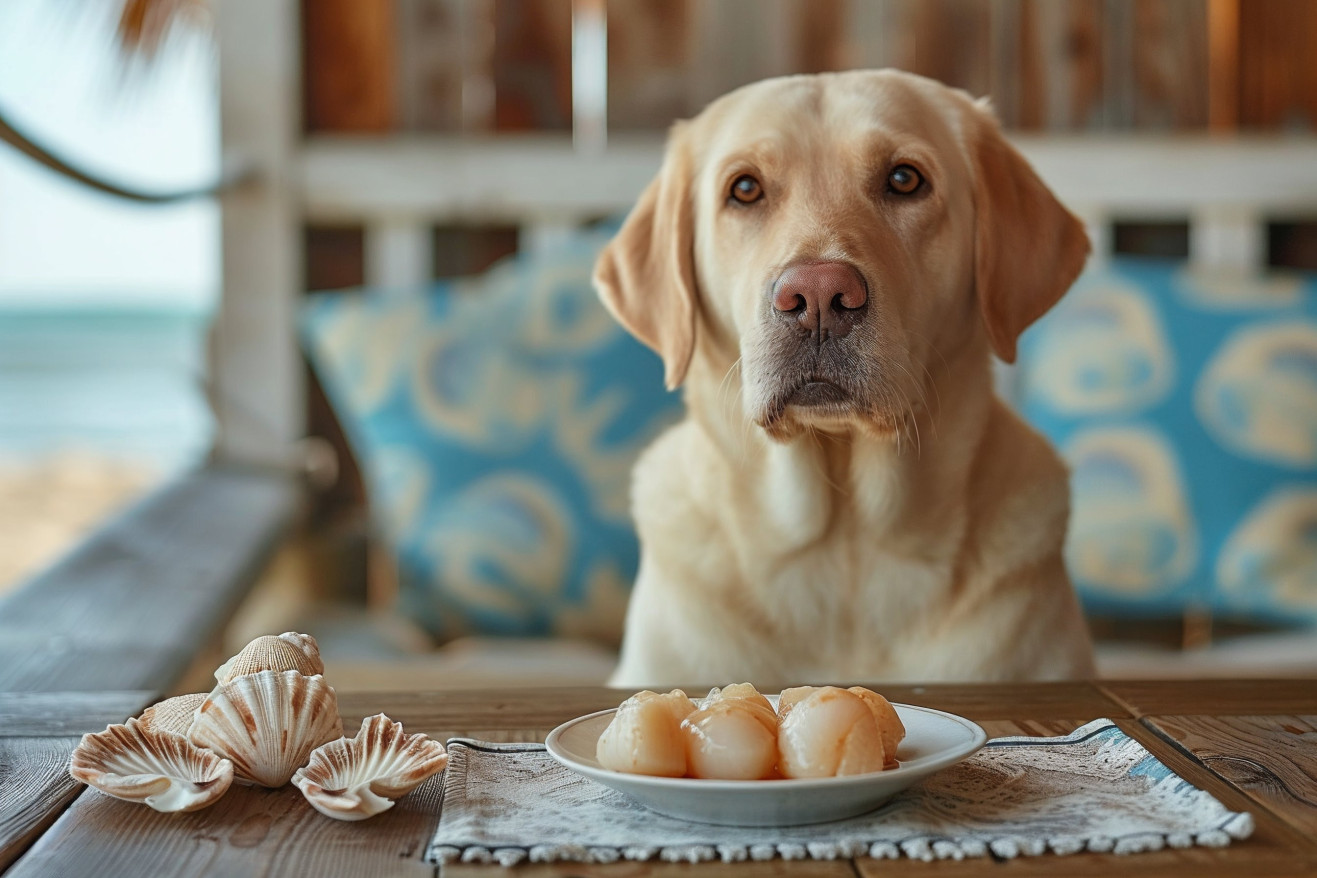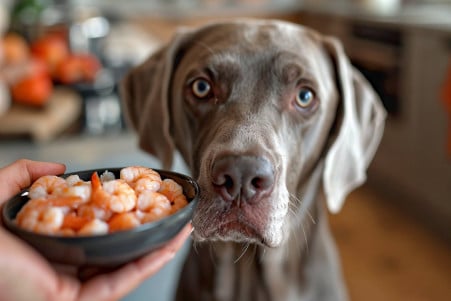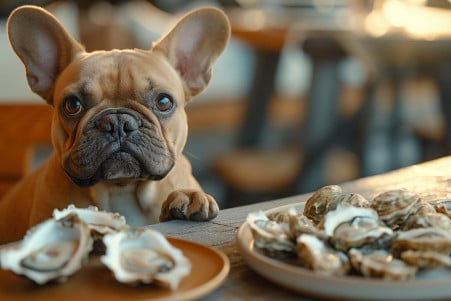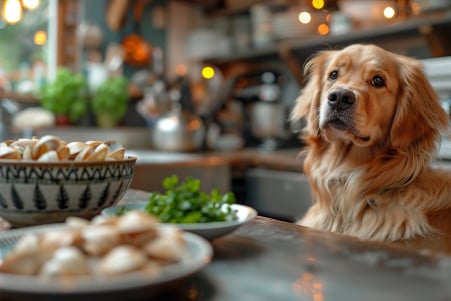Can Dogs Eat Scallops? Safe Seafood Feeding Guide for Pet Owners
9 February 2024 • Updated 9 February 2024

Scallops are a tasty treat for people, but can you share them with your furry friend? The answer is yes, dogs can eat scallops, but there are some important things to keep in mind. Scallops should be cooked, unseasoned, and free from any added oils. They can provide your dog with protein, magnesium, and potassium.
However, it’s best to avoid raw scallops because of the potential for bacterial contamination. As always, talk to your vet before adding a new food to your dog’s diet.
This article will cover a range of topics related to veterinary nutrition and food safety to ensure you have a well-rounded understanding of how to safely feed scallops to dogs.
This includes a look at the nutritional value of scallops, potential health concerns, the best ways to prepare scallops for dogs, and tips for introducing this type of seafood to your dog.
It will also discuss whether or not scallops are safe for dogs with certain dietary needs and health issues. By the end of this article, you should have the information you need to decide whether or not scallops are a good addition to your dog’s diet.
Can dogs eat scallops?
Protein and More: Nutritional Benefits of Scallops for Dogs
Scallops are a nutritional powerhouse for dogs, providing high-quality protein and low fat, which makes them a great option for dogs in moderation. According to Verywell Fit, scallops are a good source of lean protein, which is important for a dog’s muscle growth and maintenance. Their low fat content also helps dogs maintain a healthy weight.
In addition to protein, scallops are packed with essential vitamins and minerals that can help support your dog’s health. They are an excellent source of selenium, which Verywell Fit says that scallops provide 46% of the daily value in one serving. Selenium, as well as zinc and vitamin B12, which are also found in scallops, are important for supporting a dog’s immune system and metabolism.
Scallops also contain omega-3 fatty acids, which are best known for their ability to support heart and brain health, according to WebMD and Medical News Today. This can help support healthy blood flow and brain function in dogs.
While scallops have higher levels of dietary cholesterol and sodium than other types of seafood, these are less of a concern for dogs. Plus, the cholesterol in scallops is low, especially if they are cooked without added fats. It’s also important to note that dogs can tolerate more dietary cholesterol than humans, according to Medical News Today.
In short, scallops offer a range of valuable nutrients that can help support a well-rounded approach to your dog’s health. However, it’s important to be aware of potential health risks associated with eating scallops, including allergies and contamination, which will be covered in more detail below.
Safety and Precautions When Feeding Your Dog Scallops
While scallops can be a healthy addition to your dog’s diet, there are some important safety considerations to keep in mind. Raw or undercooked scallops can harbor harmful bacteria and parasites, which can lead to food poisoning. As Chewy points out, it’s important to remove the shells and cook the scallops thoroughly to avoid these risks.
The ocean is also home to a variety of pollutants, including heavy metals, which can be absorbed by scallops and other seafood. These pollutants can be especially problematic for dogs with preexisting health conditions, such as kidney disease, which can make the kidneys more vulnerable to damage from these toxins.
Allergies are another concern when it comes to feeding your dog scallops or any other new food. New York Dog Nanny notes that shellfish allergies in dogs can cause a range of symptoms, including itchy skin, digestive problems, and more severe reactions. Make sure to watch your dog for any signs of an allergic reaction, including vomiting, diarrhea, and skin irritation, when you first introduce scallops to their diet.
If you’re worried about allergies, there are shellfish-free alternatives, such as plant-based glucosamine supplements, that can help support your dog’s joint health without the risk of an allergic reaction. Always talk to your vet about how to ensure your dog’s diet is nutritionally complete and how to manage any potential health concerns when feeding your dog scallops.
How to Make Sure the Scallops You Feed Your Dog Are Safe
When making scallops for your dog, it’s important to make sure that they are safe to eat. To ensure that there are no bacteria or parasites present in the final product, we suggest boiling or baking the scallops.
As noted by Better Homes & Gardens, make sure to cook the scallops until they are opaque and firm. Don’t add any seasonings, butter, or oil, as these can be hard for a dog to digest and can lead to weight gain.
Make sure the scallops you buy smell fresh and sweet to make sure that they are safe to eat and to minimize the risk of contamination. Allrecipes notes that fresh scallops should be used the day you buy them, and frozen scallops should be thawed in the refrigerator, not at room temperature, to make sure that they are safe to eat.
Before cooking, make sure to remove the scallops from their shells to make sure that they don’t pose a choking hazard, and rinse them well.
When it comes to serving sizes, make sure to keep them in moderation. Scallops should be an occasional treat and not a regular part of your dog’s diet.
By following these tips, you can make sure that you are giving your dog a treat that is both delicious and nutritious and that will help support their health without going overboard. Always talk to your vet about the right serving size for your dog based on their individual needs, including their size, breed, and dietary requirements.
Always Ask a Vet Before Giving Your Dog Scallops
Always ask a vet before giving your dog scallops, or any new food. Even if you prepare them properly, scallops can be dangerous for dogs, as Hepper points out. A vet can make sure that any new foods you introduce to your dog are appropriate and safe by giving you personalized recommendations based on your dog’s age, health, and dietary needs.
Vets can also help you rule out food allergies, which is important for your dog’s well-being. If your dog experiences symptoms like vomiting and diarrhea, it could be a sign of an allergic reaction, and a vet can help you introduce new foods safely and manage any negative reactions, as Hepper explains.
As a result, it’s best to feed dogs scallops in moderation and with professional oversight to ensure that you’re getting the professional guidance you need, according to SpotPetIns.com.
Professional guidance is important for maintaining a healthy and balanced diet for your dog. While scallops have their benefits, including their protein, magnesium, and potassium content, they should be saved for special occasions, according to Rover.com. By asking a vet for their input, you can make sure that you’re giving your dog the best care possible and helping them stay healthy and happy.
Scallops for Dogs: The Bottom Line
When prepared correctly, scallops can be a nutritious and delicious snack for dogs. They are a good source of protein, essential vitamins, and omega-3 fatty acids, all of which can be a positive addition to your dog’s diet. However, it’s important to reiterate the importance of cooking scallops thoroughly since raw seafood can lead to a number of health issues, including bacterial and parasite infections.
As always, make sure to talk to your vet before introducing scallops, or any other new food, to your dog. This will help ensure that the treat is safe for your dog’s specific dietary needs and that any potential food allergies are properly addressed.
You’ll also want to keep a close eye on your dog when you give them scallops or any other new food to make sure that they don’t have any adverse reactions.
It’s important to find a balance between the nutritional benefits of scallops and the safety considerations that come with feeding them to your dog. If you do, you can give your dog a special treat without putting their health at risk. As we wrap up, it’s important to remember that taking a thoughtful approach to your dog’s diet can help keep them healthy and happy.


